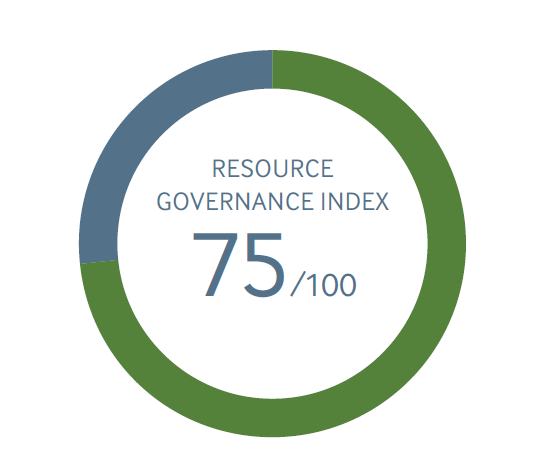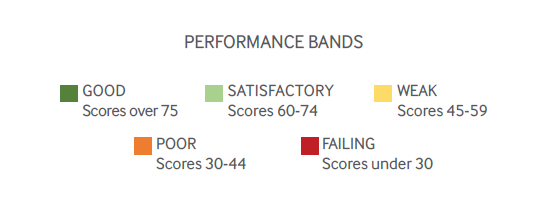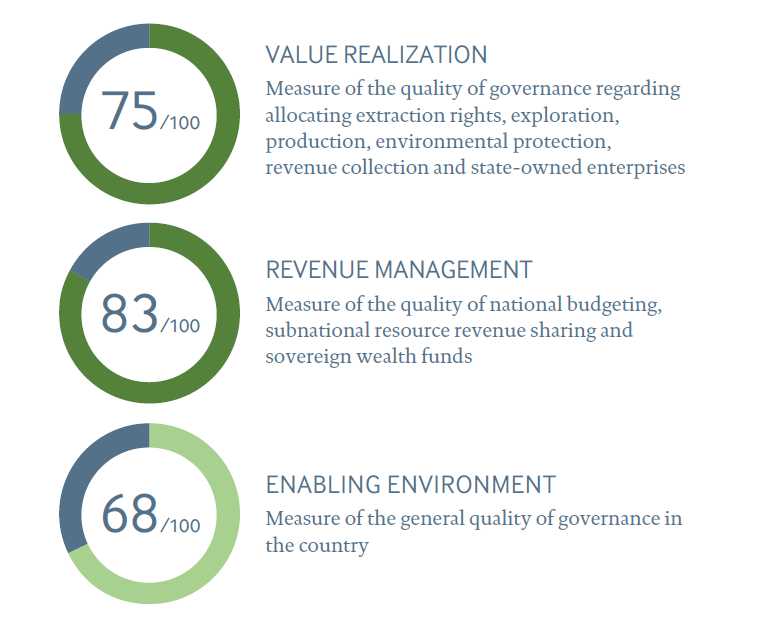
2021 Resource Governance Index: Colombia (Mining)
Español »
This briefing presents the results and recommendations from the 2021 Resource Governance Index for Colombia's mining sector.
Colombia’s mining sector scored 75 out of 100 points in the 2021 Resource Governance Index (RGI), placing it in the “good” performance band. The assessment, which focused on gold mining, shows an increase of 6 points since the 2017 RGI.
The scores for the components and subcomponents in the 2021 RGI for the mining sector in Colombia range from “good” to “satisfactory.” Revenue management received the highest score with 83 points. Important gains were also made in value realization, which jumped from 59 points in the 2017 RGI to 75 in the 2021 assessment. Nonetheless, work is still needed in terms of licensing and compliance with standards to mitigate local impacts.
Key messages:
- Colombia improved its governance of licensing due to the development and implementation of the online ANNA Minería platform by the National Mining Agency (Agencia Nacional de Minería, ANM).
- On local impact, the regulation of environmental impact assessments has progressed under the National Environmental Licensing Authority (Autoridad Nacional de Licencias Ambientales, ANLA), as well as the environmental license procurement process through the VITAL platform. However, it is not yet possible to consult licenses online.
- In terms of transparency, there has been no progress in the compulsory disclosure of tax and royalty payments or of information on companies’ beneficial owners, which are standard transparency requirements as part of the Extractive Industries Transparency Initiative (EITI).
Given the importance of gold mining in Colombia, NRGI recommends the following courses of action to further advance good governance:
- The Congress of the Republic of Colombia should pass legislation on real beneficial ownership and on the mandatory and non-voluntary disclosure of payments made to the state by all mining companies. Both of these are EITI Standard requirements, of which Colombia is an implementing country.
- The National Environmental Licensing Authority should enable the VITAL platform to allow online access to environmental impact assessments, mitigation plans, and others, to ensure effective disclosure of environmental licensing.
- The Ministry of the Treasury should publish the annual reports of the Savings and Stabilization Fund. Although this isn’t stipulated in the regulatory framework for the sovereign wealth fund, ensuring access to annual reports including information on deposits and withdrawals, as well as a detailed breakdown of investments and their yields, would constitute best practice.
- The Vice-Ministry of Mines and the National Mining Agency should promote the development and implementation of a regulatory framework for mine closures as well as operational issues such as compensation and resettlement.
- The Colombian Government can make strides toward consolidating benefits in mining territories by strengthening forward and backward linkages. Sector-specific government entities should regulate local content legislation and monitor progress in mining companies’ efforts to develop local suppliers and vendors and provide local employment.
The 2021 RGI assesses how 18 resource-rich countries govern their oil, gas and mineral wealth. The index composite score is made up of three components. Two measure key characteristics of the extractives sector – value realization and revenue management – and a third captures the broader context of governance — the enabling environment. These three overarching dimensions of governance consist of 14 subcomponents, which comprise 51 indicators, which are calculated by aggregating 136 questions. For more information on the index and how it was constructed, review the RGI Method Paper.


